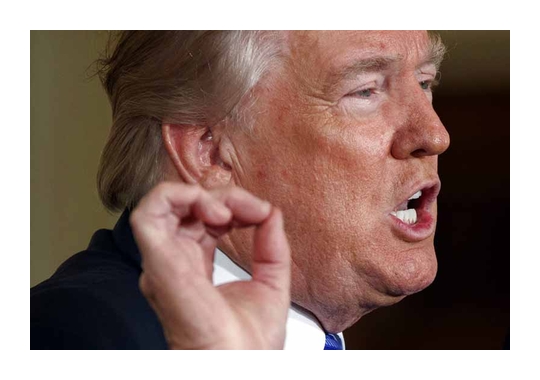Trump: Not 'that far off' from passing health overhaul

Washington (AP) — Making a final push, President Donald Trump said he doesn't think congressional Republicans are "that far off" on a health overhaul to replace "the dead carcass of Obamacare." Expressing frustration, he complained about "the level of hostility" in government and wondered why both parties can't work together on the Senate bill as GOP critics expressed doubt over a successful vote this week.
It was the latest signs of high-stakes maneuvering over a key campaign promise, and the president signaled a willingness to deal.
"We have a very good plan," Trump said in an interview broadcast Sunday. Referring to Republican senators opposed to the bill, he added: "They want to get some points, I think they'll get some points."
Trump's comments come amid the public opposition of five Republican senators so far to the Senate GOP plan that would scuttle much of former President Barack Obama's health law.
Unless those holdouts can be swayed, their numbers are more than enough to torpedo the measure developed in private by Senate Majority Leader Mitch McConnell, R-Ky., and deliver a bitter defeat for the president. That's because unanimous opposition is expected from Democrats in a chamber in which Republicans hold a narrow 52-48 majority.
Trump bemoaned the lack of bipartisanship in Washington, having belittled prominent Democrats himself.
"It would be so great if the Democrats and Republicans could get together, wrap their arms around it and come up with something that everybody's happy with," the president said. "And I'm open arms; but, I don't see that happening. They fight each other. The level of hostility."
Trump has denigrated Democrats on numerous occasions, including a jab at Democratic Sen. Elizabeth Warren in the same interview: "She's a hopeless case. I call her Pocahontas and that's an insult to Pocahontas." In a tweet last week after Georgia's special House election, Trump also criticized House Democratic Leader Nancy Pelosi and Senate Democratic Leader Chuck Schumer. "I certainly hope the Democrats do not force Nancy P out. That would be very bad for the Republican Party — and please let Cryin' Chuck stay!" he wrote.
In the broadcast interview, Trump did not indicate what types of changes to the Senate bill may be in store, but affirmed that he had described a House-passed bill as "mean."
"I want to see a bill with heart," he said, confirming a switch from his laudatory statements about the House bill at a Rose Garden ceremony with House GOP leaders last month. "Healthcare's a very complicated subject from the standpoint that you move it this way, and this group doesn't like it."
"And honestly, nobody can be totally happy," Trump said.
McConnell has said he's willing to make changes to win support, and in the week ahead, plenty of backroom bargaining is expected. He is seeking to push a final package through the Senate before the July 4 recess.
At least two GOP senators said Sunday that goal may prove too ambitious.
"I would like to delay," said Sen. Ron Johnson, R-Wis., one of the five senators opposing the bill. "These bills aren't going to fix the problem. They're not addressing the root cause," he said, referring to rising health care costs. "They're doing the same old Washington thing, throwing more money at the problem."
Sen. Susan Collins, R-Maine, said seven to eight other senators including herself were troubled by provisions that she believes could cut Medicaid even more than the House version.
Collins, who also opposes proposed cuts to Planned Parenthood, said she would await an analysis Monday from the nonpartisan Congressional Budget Office before taking a final position on the bill. But she said it will be "extremely difficult" for the White House to be able to find a narrow path to attract both conservatives and moderates.
"It's hard for me to see the bill passing this week," Collins said.
The Senate bill resembles legislation the House approved last month. A Congressional Budget Office analysis of the House measure predicts an additional 23 million people over the next decade would have no health care coverage, and recent polling shows only around 1 in 4 Americans views the House bill favorably.
The legislation would phase out extra federal money that more than 30 states receive for expanding Medicaid to additional low-income earners. It would also slap annual spending caps on the overall Medicaid program, which since its inception in 1965 has provided states with unlimited money to cover eligible costs.
Conservative Sen. Rand Paul, R-Ky., said he is opposing the Senate bill because it "is not anywhere close to repeal" of the Affordable Care Act. He says the bill offers too many tax credits that help poorer people to buy insurance.
"If we get to impasse, if we go to a bill that is more repeal and less big government programs, yes, I'll consider partial repeal," he said. "I'm not voting for something that looks just like Obamacare."
Trump said he thinks Republicans in the Senate are doing the best they can to push through the bill.
"I don't think they're that far off. Famous last words, right? But I think they're going to get there," Trump said of Republican Senate leaders. "We don't have too much of a choice, because the alternative is the dead carcass of Obamacare."
Schumer said Democrats have been clear they will cooperate with Republicans if they agree to drop a repeal of the Affordable Care Act and instead work to improve it. Still, Schumer acknowledged it was too close to call as to whether Republicans could muster enough support on their own to pass the bill.
He said they had "at best, a 50-50 chance."
Trump was interviewed by "Fox & Friends," while Collins, Schumer and Paul appeared on ABC's "This Week." Johnson spoke on NBC's "Meet the Press."
By Hope Yen, Associated Press. Copyright 2017 Associated Press. All rights reserved.
The Gayly – June 25, 2017 @ 3:30 p.m.





